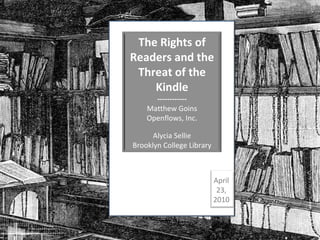LACUNY-The Rights of Readers and the Threat of the Kindle
- 1. April 23, 2010 The Rights of Readers and the Threat of the Kindle ------------ Matthew Goins Openflows, Inc. Alycia Sellie Brooklyn College Library
- 2. WHAT THIS TALK IS ABOUT: The rights we have in print that we currently give up with the purchase of (closed) digital books. WHAT THIS TALK IS NOT ABOUT: Preferences between ink on paper vs. reading from a screen Aesthetic and functional issues between different book media Not a condemnation of ebooks as a medium/format, but a summary of some of the rights we as librarians need to be aware of when purchasing ebooks for our collections
- 3. WHY ARE ELECTRONIC BOOKS APPEALING? (a short list) Speedy delivery of materials (downloads vs. physical delivery) No physical object that takes up space Full text can easily be searched/analyzed/edited Materials can be viewed by multiple people at one time An item doesnŌĆÖt need to be ŌĆ£checked outŌĆØ or inaccessible; it wonŌĆÖt be misplaced, stolen or vandalized An ebook reading device can contain an entire library of materials Ebook devices make collections mobile
- 4. STATUS QUO: WHAT IS HAPPENING WITH EBOOKS TODAY? Devices Reader technologies becoming accepted as household appliances: Kindle, iPad, Nook, etc. Open Access Movement Public Domain works--Project Gutenberg Open Library Libraries Purchasing individual titles as well as subscriptions to web-based collections of ebooks, such as ebrary Experimenting with devices Rights and Restrictions DRM and Licensing
- 5. IS DIGITAL RIGHTS MANAGEMENT REALLY ABOUT RIGHTS ? What is Digital Rights/Restrictions Management (DRM)? How does it work?
- 6. HOW DOES DRM AFFECT OUR RIGHTS WHEN WE PURCHASE EBOOKS?
- 7. RENTING vs. BUYING and ONLINE ACCOUNTS Items can be instantly purchased, but also instantly repossessed
- 8. THE 1984 INCIDENT, AND WHY THIS DISAPPEARANCE WAS NOT SURPRISING TO CRITICS OF DRM
- 9. ITŌĆÖS NOT JUST THE KINDLE that THREATENS READERSŌĆÖ RIGHTSŌĆ”
- 10. DIGITAL BOOKS ARE STILL APPEALING WITHOUT DRM All the features that make ebooks and ebook devices amazing would still continue to amaze without DRM!
- 11. If we are AGAINST DRM, what are we FOR? S. R. RanganathanŌĆÖs 5 Laws of Library Science: 1. Books are for use. 2. Every reader his [or her] book. 3. Every book its reader. 4. Save the time of the reader. 5. The library is a growing organism.
- 12. READERS' BILL OF RIGHTS for DIGITAL BOOKS * 1. Ability to retain, archive and transfer purchased materials 2. Ability to create a paper copy of the item in its entirety 3. Digital Books should be in an open format (e.g. you could read on a computer, not just a device) 4. Choice of hardware to access books (e.g. in 3 years when your device has broken, you can still read your book on other hardware) 5. Reader information will remain private (what, when and how we read will not be stored, sold or marketed) *As readers of traditional print materials, we are already guaranteed all of these rights--and we should not be denied them due to the medium in which we are reading.
- 13. AUTHORSŌĆÖ BILL OF RIGHTS for DIGITAL BOOKS Authors have the ability to grant readers of their work additional rights through licenses such as the Creative Commons or General Public License (GPL) Authors should have the ability to share or sell copies of their work through any channel (not just walled gardens like iTunes or Amazon)
- 14. DATABASE SUBSCRIPTIONS AND ELECTRONIC JOURNALS VS. ELECTRONIC BOOKS
- 15. CONCERNS AND ACTIONS FOR CUNY LIBRARIANS Adopt the Readers' Bill of Rights for Digital Books! Use the AuthorsŌĆÖ Bill of Rights for our own work! We can use our library buying power to sway vendors, publishers, authors and corporations We should be aware of how our purchases (of items such as Kindles or subscriptions to online ebook databases) affect patronŌĆÖs rights and the development of our collections
- 16. Alycia Sellie [email_address] Matthew Goins [email_address] http://readersbillofrights.info
Editor's Notes
- Talk about our use of ŌĆ£the kindleŌĆØ to mean all DRM proprietary devices While there are many competitors, we're focusing on the Kindle as the most popular example of a closed ebook device that employs DRM There are other readers that similarly use closed technologies, but for the purposes of our talk we find that the Kindle is the most accessible and illustrative example of our arguments Matt notes: Publishers are offering two products: Paper books and e-books (leaving aside rentals and other schemes). When we collect paper books, we buy objects, and we get 200 or so years worth of case law protecting our legal rights under the first amendment. When we buy e-books, we get simply a license, and we explicitly sign away all our rights.











![If we are AGAINST DRM, what are we FOR? S. R. RanganathanŌĆÖs 5 Laws of Library Science: 1. Books are for use. 2. Every reader his [or her] book. 3. Every book its reader. 4. Save the time of the reader. 5. The library is a growing organism.](https://image.slidesharecdn.com/kindlefinal-100424111414-phpapp02/85/LACUNY-The-Rights-of-Readers-and-the-Threat-of-the-Kindle-11-320.jpg)




![Alycia Sellie [email_address] Matthew Goins [email_address] http://readersbillofrights.info](https://image.slidesharecdn.com/kindlefinal-100424111414-phpapp02/85/LACUNY-The-Rights-of-Readers-and-the-Threat-of-the-Kindle-16-320.jpg)